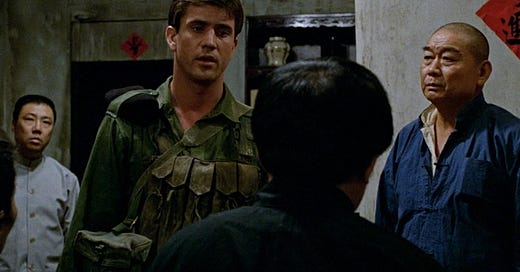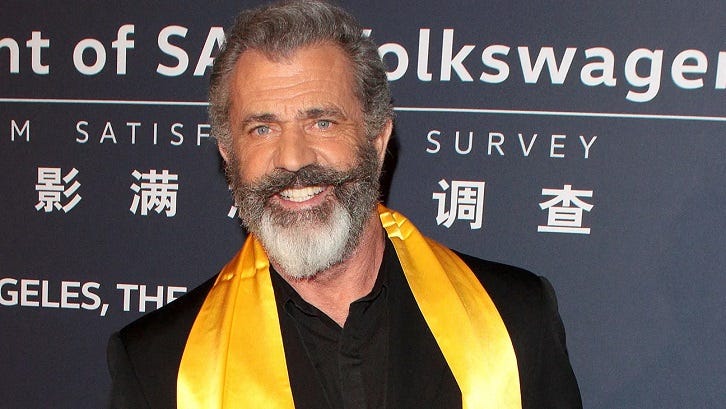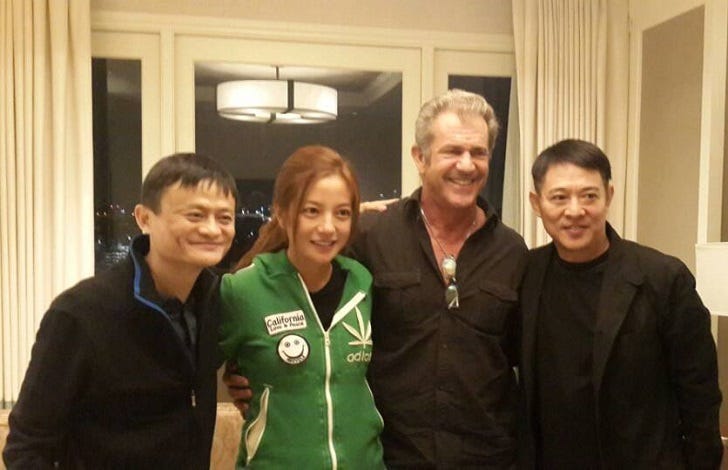Australia and Hong Kong were British colonies. In spite of this, Attack Force Z (a 1979 film initially known as The Z Men) was an unusual collaboration between an Australian production company and a Taiwanese one. Mel Gibson co-starred in this film after starring in Mad Max, which had just been released in April 1979. Strangely, Attack Force Z didn’t get released until June 1982 - six months after the release of Mad Max 2. In Australia, the World War II film (which featured Sam Neill) was a flop but it was a big hit in Taiwan because of the popularity of a Taiwanese actor named Ko Chun-Hsiung (who was a top gangster). The Chinese box office success would have been more than enough to interest a Taiwanese investor had Mel Gibson decided to pursue a career with Hong Kong production companies. The Taiwanese investors were the life force of Hong Kong cinema’s golden age, and it just so happened that Mel Gibson took a two year break from Hollywood from 1984 to 1986. He witnessed something in Hollywood that was so abhorrent that he still won’t specify, but I’ve already covered that in my WordPress article titled The Hiatus.
With Mel being terrified of Hollywood, it wouldn’t have been a stretch to see if there were any Hong Kong production companies who were interested in producing any English language films. Australian actor George Lazenby had co-starred in one such film: The Man from Hong Kong (1975). Sammo Hung was the fight choreographer. Like Attack Force Z, this was directed by an Australian and starred an actor who had a high status in the Taiwanese underworld. This time, it was Jimmy Wang Yu. In late July 1973, George Lazenby had signed a three picture deal with a Hong Kong production company called Golden Harvest. Like Mel Gibson, George was in despair. It’s not like Mel was too much of a snob to consider working for Hong Kong film-makers. He was well-known for being a down-to-earth guy, and he has an interest in Chinese films as I will later explain in this article. In the meantime, we need to address why Mel returned to California for Lethal Weapon (which began filming in August 1986). He was guaranteed protection by powerful producer Joel Silver, who is a big fan of Hong Kong action movies.
Protection is why 1976-era Jackie Chan no longer had to live with his parents in Australia once he had signed a deal to work for Hong Kong film director Lo Wei in Taiwan. In fact, Jackie could easily have worked as a stuntman on The Man from Hong Kong in late 1974 but he chose to work with Sammo in South Korea on another Golden Harvest film - John Woo’s The Hand of Death. Jackie’s identity as an Australian citizen is interesting when you consider how long that it took him to make a martial arts film in Australia i.e. Mr. Nice Guy was made in 1996. This was before Hong Kong was handed back to China in July 1997. Despite having a reputation for being an action movie star, Mel Gibson is a well-read man as he talked about Asian politics in an interview during the July 1987 Australian federal election: “You get hold of this foreign debt to get us out of trouble and then they have something called foreign aid, which would be ok if it was feeding starving children or something but it's not. They're giving many millions to countries like Red China, North Vietnam, South Korea to develop steel industries and they give this money to them interest-free.”
When Lethal Weapon came out in 1987, there was an interview that Mr. Gibson did for a newspaper called The Oklahoman where he showed an awareness of Hong Kong action cinema while talking about the film’s final fight scene with Gary Busey: “We did things that were very choreographed and by-the-numbers for weeks and weeks and weeks until it was drilled right into us, and then when it came to shooting it, they said, "Now tear it down. We just want meat. Try and kill each other." And what you get is something like meat clashing, but with little overtones of martial arts. You can just see that in there. It's not too neat, like a Chinese Kung Fu movie.”
Jackie’s Project A II was also released in 1987, and both movies share a similar scene where the police agree not to arrest someone straight away just so that the hero can have a fight with him. In 1989, Mel Gibson starred alongside Goldie Hawn in an action comedy titled Bird on a Wire. There is a motorcycle chase scene that transpires in a narrow Chinatown alley, which would appear to have been influenced by a vaguely similar scene in Jackie Chan’s Project A (1983). Steven Spielberg had done a slightly modernized update of Jackie’s scene for Indiana Jones and the Last Crusade in 1988. Originally, the star of Bird on a Wire was going to be Kurt Russell but he turned it down to co-star in Sylvester Stallone’s Tango & Cash.
Had Kurt accepted Bird on a Wire to be with his girlfriend then Gibson would more likely have been Stallone’s sidekick, and it would represent another Hong Kong connection for him seeing as how Sly wanted to remake a key action scene from Jackie Chan’s Police Story (1985). One of the producers of Bird on a Wire was Rob Cohen, who not only directed Dragon: The Bruce Lee Story in 1992 but had produced The Hard Way featuring a brief cameo from Conan Lee (who was credited in the stunts section of the closing credits instead of the cast list). On the subject of Conan, he was cast in Mel Gibson’s Lethal Weapon 4 (1998). This featured Jet Li as the villain, and Corey Yuen as the fight choreographer.
Director Richard Donner later hired Corey to work as a stunt coordinator on X-Men (2000) while Mel reunited with Jet to produce a pilot for a TV series, Invincible, that didn’t get any more episodes. The star of the pilot, Billy Zane, had previously attended a 1995 awards ceremony (10th Annual American Cinematheque) which was honoring Mel. The male stunt coordinator for Invincible was a H.K. film industry legend named Ching Siu-Tung. Because he couldn’t speak English, character actor George Cheung was his assistant. There was a fifteen minute production featurette that was aired on TV where you could see this. The man known as Tony Ching got a bunch of Wushu guys to train the actors in 2000. Mel Gibson must have got along real well with Jet Li to attend his wedding to Nina Li Chi in September 1999.
When Joel Silver produced Mel’s Conspiracy (1997), it’s a shame that he couldn’t get a Hong Kong director. Richard Donner had already directed Mel in what was supposed to be the Lethal Weapon trilogy along with a Western called Maverick. Even in Lethal Weapon 3 (1992), there was an attempt to evoke the memory of a John Woo film by having Mel firing two guns at once - something that he hadn’t done in the previous films. There was a July 1998 article for the Hong Kong Standard that was written by a Taipei writer named Dennis Eng. Titled Villain Today, Hero Tomorrow, Dennis learned that Joel Silver was introduced to Hong Kong films through a young executive who used to work for him. Joel watched films by the likes of John Woo, Tsui Hark and Ringo Lam on LaserDisc. He remembered: “But most of them were without subtitles, so I couldn't understand them.”
Joel would eventually get the chance to meet John Woo, Tsui Hark and Ringo Lam but Jean-Claude Van Damme was luckier than him in actually getting to work with them. JCVD was fired by Silver from playing the titular Predator (1987), so it took a long time for the two to reunite on Dragon Eyes (2012) and Enemies Closer (2013). Joel later developed another science-fiction film called Face/Off, which he wanted to give to John Woo but the latter wasn’t big on sci-fi. Had Woo accepted, we would more likely have seen Mel Gibson play Sean Archer. Years after the initial offer, Face/Off had been sold to a studio called Paramount. The rest is history. I’m sure that Mel saw the irony in John Woo later directing Tom Cruise in Australia for Mission: Impossible II (2000). The Matrix (1999) was also filmed in Australia, and it shared an art director with this movie. This art director, Michelle McGahey, worked as a production designer for Invincible (2001).
It doesn’t end there for Mel and all things Hong Kong. In Payback (1999), there is an action scene involving firing guns underneath an enemy’s car that reminded me of a Wong Jing film titled Return to a Better Tomorrow (1994). It’s not a coincidence given that Brian Helgeland’s plot involves a Chinese Triad, especially when you consider the source material - a 1962 novel (The Hunter) that was turned into a 1967 film (Point Blank). The Chinese connections become farcical when you see the Chinatown segue of Mel’s rom-com What Women Want (2000), which was remade as a 2011 Chinese film starring Andy Lau and Gong Li. One of Mel’s earlier films, Lethal Weapon, was remade as a Hong Kong movie called Satin Steel (1994). Before Tony Leung Siu-Hung’s remake, Wong Jing was inspired by Joe Pesci’s dynamic with the mismatched cops in Lethal Weapon 2 (1989) when he made The Last Blood in 1990.
Australian stuntman Grant Page worked with Mel on what was once known as the Mad Max trilogy. Grant had worked on Jackie Chan’s Mr. Nice Guy and Jimmy Wang Yu’s The Man from Hong Kong but he didn’t work on John Woo’s Mission: Impossible II. Then again, Grant didn’t work on The Matrix either. Back to Mel, the July 24 1998 issue of The Straits Times (a Singaporean newspaper) had an interview with him where he talked briefly about his interest in Chinese cinema. He was asked if he was planning to do a film with director Chen Kaige. Mel’s response was: “Maybe. I know him. I really like his work.”
When asked what the film was about, Mel said: “I'm not sure if it's going to happen yet. Neither does he. He's in the middle of this big film about the first dynasty in China. I went out to Beijing, he showed me the set - enormous!”
On his social media platforms (Instagram, Twitter and Facebook), Jet Li posted the above photo in February 2017 with the following caption: “I have many good friends around the world in the fields of entertainment and business. This is a picture of me with Mel Gibson (who I worked with in my first Hollywood film, Lethal Weapon 4), Vicki Zhao (a famous film producer and actress in China) and Jack Ma, Founder and Chairman of Alibaba Group.”
In 2015, to everyone’s surprise, Mel was seen working as a consultant on a Chinese war film titled Unbreakable Spirit where he is also credited as a creative supervising producer. The film is known in the West as either The Bombing or Air Strike. Despite starring Bruce Willis, it got released three years later. Adrien Brody is also in the film. In 2014, Adrien played the villain in another Mainland Chinese film titled Dragon Blade. This starred Jackie Chan, whose co-star was originally going to be Mel before John Cusack had taken over the role. As for Unbreakable Spirit, how fitting that Mel’s Chinese film career is bookended by World War II.









